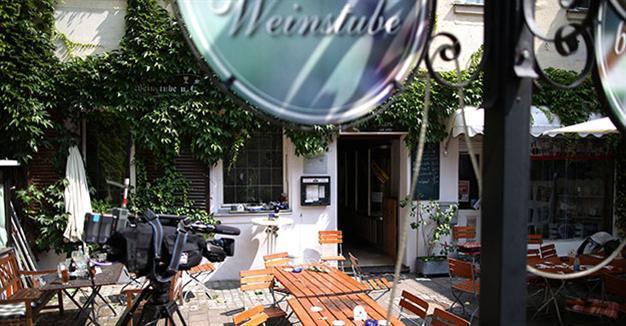ISIL claims second German attack in a week
ANSBACH, Germany

A TV camera stands near the site of a bomb attack, in the courtyard of 'Eugen's Weinstube' vine tavern in Ansbach, Germany, Tuesday July 26, 2016. In the most recent attack, a 27-year-old Syrian asylum-seeker set off a backpack laden with explosives and shrapnel Sunday night after being refused entry to a crowded music festival in the Bavarian city of Ansbach, killing himself and wounding 15 people. AP photo
A Syrian asylum seeker who blew himself up outside a German music festival had made a video pledging allegiance to the Islamic State of Iraq and the Levant (ISIL), authorities said July 25, in the second attack claimed by the jihadists in Germany in a week.The 27-year-old assailant wounded 15 people, four of them seriously, near a cafe in the southern city of Ansbach on the night of July 24 when he set off a bomb in his rucksack, killing himself.
“A video made by the assailant was found on his mobile phone in which he threatened an attack,” Bavarian state interior minister Joachim Herrmann told reporters.
“After that he announced in the name of Allah that he pledged allegiance to [ISIL chief] Abu Bakr al-Baghdadi, the well-known Islamist leader, and announced an act of revenge against Germans because they were standing in the way of Islam.”
ISIL later said via the jihadist-linked Amaq news agency that the attacker “was a soldier of the Islamic State [ISIL]” who had acted “in response to calls to target nations in the coalition fighting” the extremists.
Europe’s economic powerhouse was already reeling after four passengers and a passer-by were wounded in an axe attack on a train in Würzburg on July 18 which ISIL also claimed.
Then on July 22, nine people were killed in a shopping center shooting spree in Munich by a German-Iranian teenager with a history of psychological problems but no apparent links to Islamists.
Already steeped in grief and shock, Germans were further rattled by news that a Syrian refugee had killed a 45-year-old Polish woman with a large kebab knife at a snack bar in the southwestern city of Reutlingen on July 24.
Police, who had initially said the murder weapon was a machete, concluded that the incident in which three others were injured was likely a “crime of passion.”
















